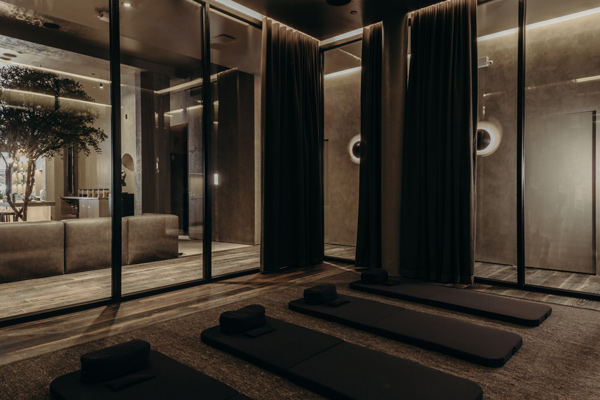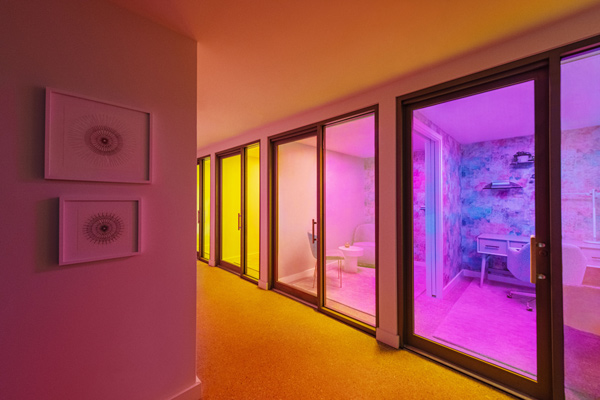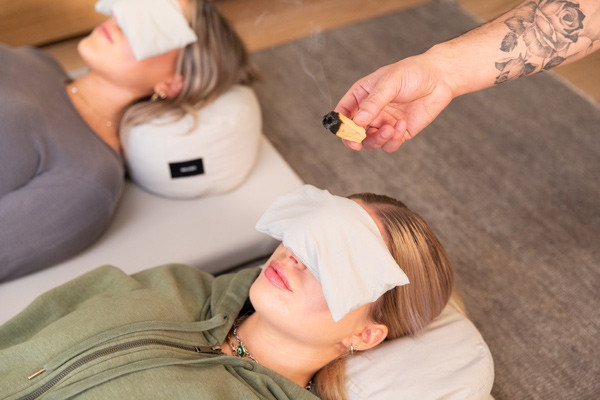Imagine a serene yet social place where you can partake in integrative medicine sessions, accelerate healing in an oxygen chamber and stimulate collagen growth while lying in a light bed. If you’re feeling more active, you might take movement or yoga classes, delve into spiritual arts and dine on organic superfoods. This isn’t a gym, a spa or even a retreat. It’s a social wellness club.
Depending on who you ask, wellness might be seen through a different lens. Often it involves maximizing emotional and physical health and longevity through mindfulness, disease prevention and alternative healing. While the term may be fuzzy, it’s clear that interest in wellness is booming. In 2023, the U.S. health and wellness market was valued at about $1.2 billion, and it’s expected to maintain steady growth, rocketing to approximately $2.1 billion by 2033.
Socialization: The missing piece
Relationships have always played a role in emotional well-being. Feeling isolated has been shown to negatively impact mind-body health, according to the CDC, increasing the risk of anxiety, depression and heart disease. Decades of research have explored the links between social ties, health and human development. One Harvard Health study consisting of more than 51,000 participants found that personal happiness and satisfaction were directly related to a diverse range of social interactions.

Considering how critical the need for human interaction is, we are at a unique historical moment. Social distancing and masking has affected the way we connect with others, leaving many today feeling disconnected and unsure of how to resume normal activities. In 2019, when Jonathan Leary, D.C., founded Remedy Place in West Hollywood, it was one of the first social wellness clubs. The intention was to create a beautiful atmosphere for social self-care, which he describes as “enhancing our health through meaningful connections and shared experiences.” The inclusion of a social aspect was an outgrowth of Leary’s previous health practice, which was focused on “drug-free approaches to surgery prevention and chronic pain rehabilitation.” Back then, patients would continually tell Leary that while they felt physically incredible, they emotionally felt alone and alienated from their friends. The revelation helped him recognize the need to mesh health and wellness with social interaction.
Balance your mind and body at a social wellness club
Science has shown that mindfulness practices can actually alter the brain, may help prevent age-related deterioration and improve cognitive function. Coupling mind-body practices with socializing increases benefits exponentially. Not only does socializing improve well-being, but according to Leary, the interactions themselves can also “amplify the benefits of traditional self-care routines.”
When people come together with a shared purpose, whether it’s for a sauna or breathwork ice bath class, they not only realize how much better they feel but also witness the change in those they’re doing it with. This synergistic effect contributes to others’ well-being, too, when you develop “a supportive environment around you that sets you up for even more success,” says Leary.
Today, Remedy Place has clubs in California and Manhattan. You can take part in events centered round interactions, like social acupuncture, movement classes and watch and drip, where guests are set up with vitamin IVs for a movie or special screening in the meditation cinema. These are often available via memberships or a la carte registration.
Stress reduction as preventative medicine
Traditional medicine acknowledges that stress levels can negatively impact emotional and physical health. When chronic stress leads to inflammation, it may cause weakened immunity, increase the risk of diseases, and possibly worsen conditions you already have. Some of the most effective methods of stress reduction are alternative practices that center around mindfulness. Slowed breathing triggers the parasympathetic nervous system, which helps you relax.

Another advantage of clubs like THE WELL is that because they aren’t a spa, where you book a service and then leave, they instead encourage you to deepen your awareness and linger. Each visit depends on your needs. THE WELL’s offerings include Chinese medicine, acupuncture and virtual health coaching.
There’s ample opportunity “to practice, learn and heal alongside [your] community” with chances to meet and mingle in the lounge after events, says Sarrah Hallock, co-founder and COO of THE WELL, a club with three locations in the U.S., one in Mexico and one in Costa Rica.
Experiences at THE WELL run the gamut from spiritual workshops, movement sessions, and talks on longevity, sleep and more. They also “host support circles with our advisor of head and heart, Lia Avellino, where members can come together to share and support each other’s emotional and mental well-being,” Hallock adds.
Well-being on your own terms
Not all social wellness clubs offer memberships. Co-founders of Sage+Sound, Lauren Zucker and Lacey Tisch, “wanted to make self-care a daily priority without a membership fee and create a welcoming vibe.” The common pursuit of well-being encourages forming meaningful relationships, according to Zucker and Tisch, whose club offers “everything from facials with the latest technologies to energy healing, massages, acupuncture and sound meditation classes that explore the restorative power of vibration.” So far, Zucker and Tisch have one club on Manhattan’s East side and say that they’ve seen countless connections spark “in the Study, through a manicure or even simply [over] a meal in the cafe.”

As social wellness’s popularity continues to grow, new clubs pop up in more locations. Remedy Place has plans for two new locations to open this year, and THE WELL is expanding to Europe with a club in Switzerland. The overall picture of mind-body health seems to be undergoing a metamorphosis. In an age where it’s common to work remotely and have meetings via Zoom, it’s encouraging to see a trend that recognizes the value of in-person interactions gaining momentum. Wellness is much more than healthy eating and exercise—caring for your emotional well-being is a crucial focus as well. Whether you choose to belong to a social wellness club or not, there’s much you can gain from connecting with others on a mutual path.
Photo courtesy of Remedy Place.




